Consumer Behaviour and Marketing Strategies for Travelodge Hotels
VerifiedAdded on 2023/01/12
|14
|4745
|86
Report
AI Summary
This report provides a comprehensive analysis of consumer behavior within the context of Travelodge hotels in the UK. It delves into the stages of the consumer decision-making journey, including need recognition, information search, evaluation of alternatives, selection and trial, purchase decision, and post-purchase behavior. The report explores various theories and models that influence consumer decision-making, such as economic, passive, emotional, and cognitive models, along with the levels of consumer decision-making. Furthermore, it examines the importance of the 7Ps of the marketing mix (product, price, procedure, place, promotion, people, and physical evidence) in influencing consumer choices. The report highlights the significance for marketers to map a path to purchase and understand consumer decision-making processes. It also compares and contrasts the decision-making processes of hospitality customers in the UK, explores different market research approaches and methods, and identifies factors influencing consumer behavior in the hospitality sector. Finally, the report clarifies how marketers can influence each stage of the consumer decision-making process, providing insights for effective marketing strategies.
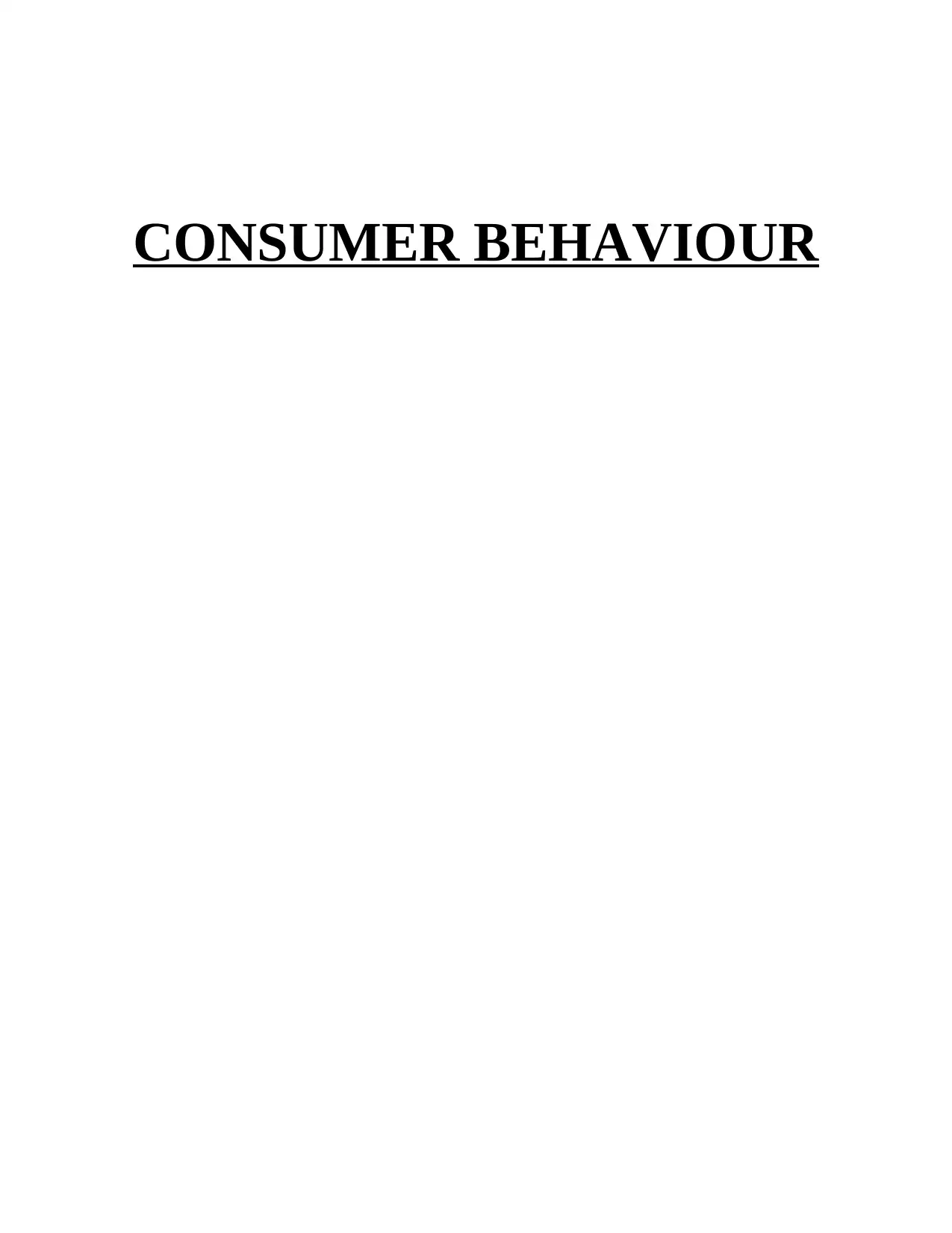
CONSUMER BEHAVIOUR
Paraphrase This Document
Need a fresh take? Get an instant paraphrase of this document with our AI Paraphraser
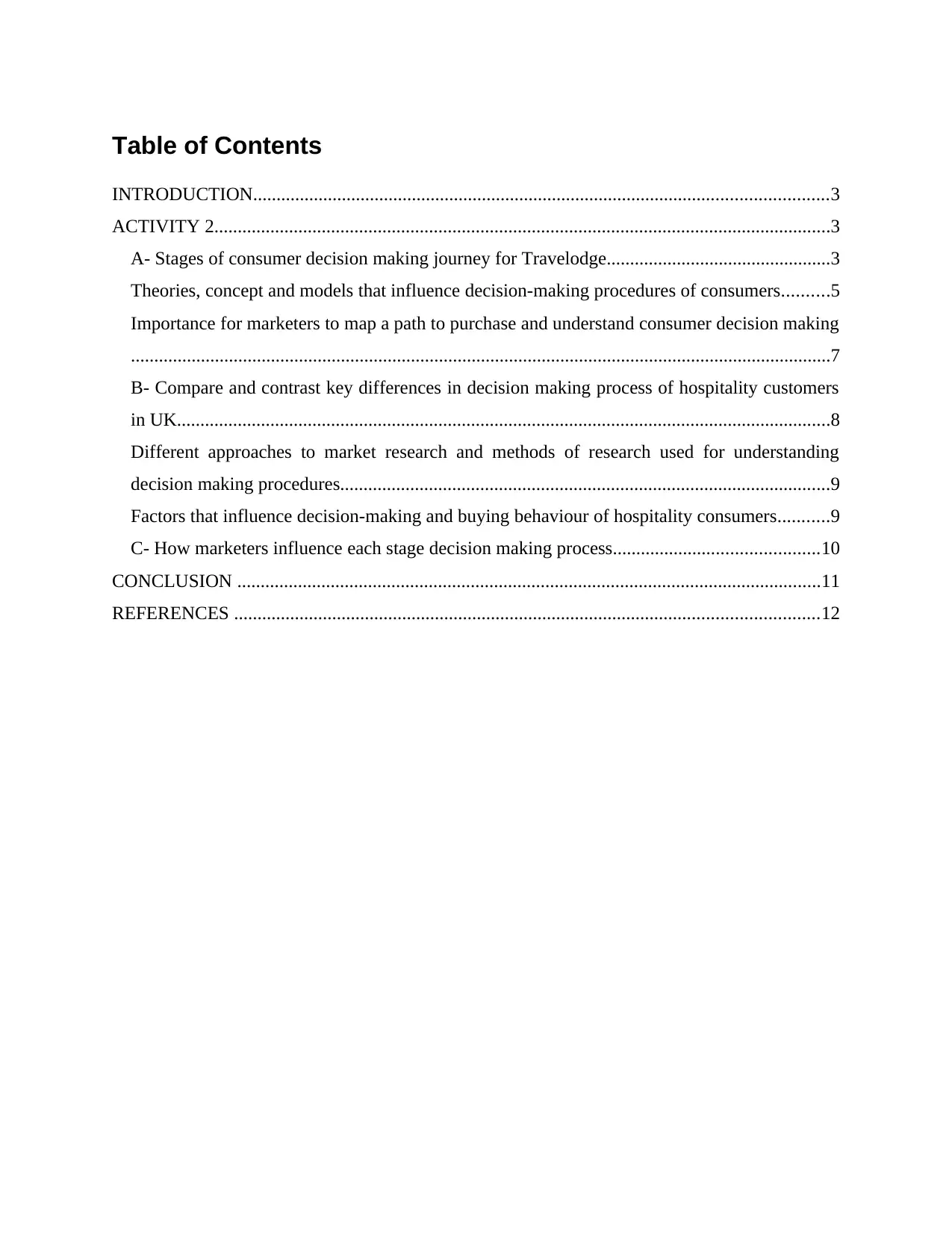
Table of Contents
INTRODUCTION...........................................................................................................................3
ACTIVITY 2....................................................................................................................................3
A- Stages of consumer decision making journey for Travelodge................................................3
Theories, concept and models that influence decision-making procedures of consumers..........5
Importance for marketers to map a path to purchase and understand consumer decision making
......................................................................................................................................................7
B- Compare and contrast key differences in decision making process of hospitality customers
in UK............................................................................................................................................8
Different approaches to market research and methods of research used for understanding
decision making procedures.........................................................................................................9
Factors that influence decision-making and buying behaviour of hospitality consumers...........9
C- How marketers influence each stage decision making process............................................10
CONCLUSION .............................................................................................................................11
REFERENCES .............................................................................................................................12
INTRODUCTION...........................................................................................................................3
ACTIVITY 2....................................................................................................................................3
A- Stages of consumer decision making journey for Travelodge................................................3
Theories, concept and models that influence decision-making procedures of consumers..........5
Importance for marketers to map a path to purchase and understand consumer decision making
......................................................................................................................................................7
B- Compare and contrast key differences in decision making process of hospitality customers
in UK............................................................................................................................................8
Different approaches to market research and methods of research used for understanding
decision making procedures.........................................................................................................9
Factors that influence decision-making and buying behaviour of hospitality consumers...........9
C- How marketers influence each stage decision making process............................................10
CONCLUSION .............................................................................................................................11
REFERENCES .............................................................................................................................12
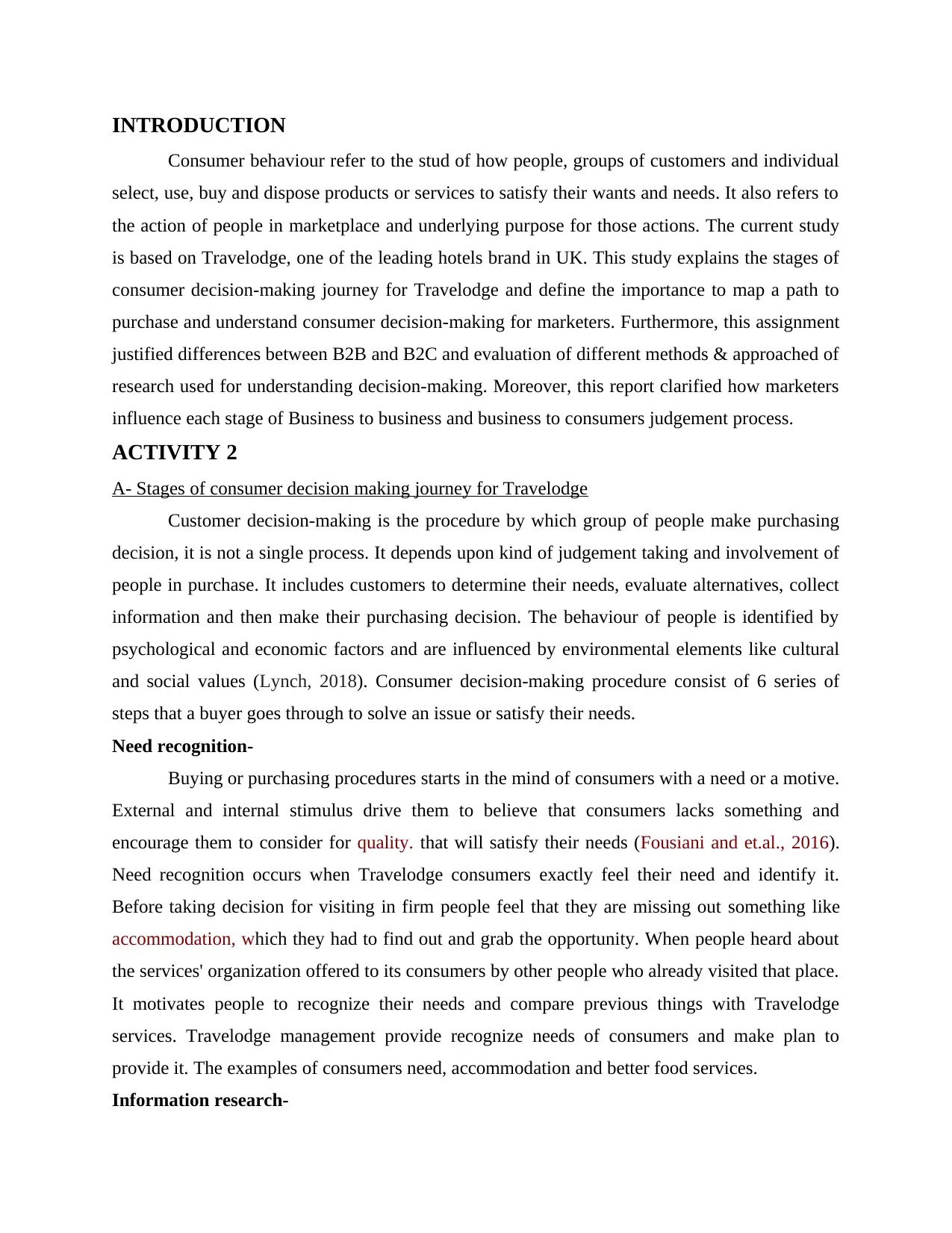
INTRODUCTION
Consumer behaviour refer to the stud of how people, groups of customers and individual
select, use, buy and dispose products or services to satisfy their wants and needs. It also refers to
the action of people in marketplace and underlying purpose for those actions. The current study
is based on Travelodge, one of the leading hotels brand in UK. This study explains the stages of
consumer decision-making journey for Travelodge and define the importance to map a path to
purchase and understand consumer decision-making for marketers. Furthermore, this assignment
justified differences between B2B and B2C and evaluation of different methods & approached of
research used for understanding decision-making. Moreover, this report clarified how marketers
influence each stage of Business to business and business to consumers judgement process.
ACTIVITY 2
A- Stages of consumer decision making journey for Travelodge
Customer decision-making is the procedure by which group of people make purchasing
decision, it is not a single process. It depends upon kind of judgement taking and involvement of
people in purchase. It includes customers to determine their needs, evaluate alternatives, collect
information and then make their purchasing decision. The behaviour of people is identified by
psychological and economic factors and are influenced by environmental elements like cultural
and social values (Lynch, 2018). Consumer decision-making procedure consist of 6 series of
steps that a buyer goes through to solve an issue or satisfy their needs.
Need recognition-
Buying or purchasing procedures starts in the mind of consumers with a need or a motive.
External and internal stimulus drive them to believe that consumers lacks something and
encourage them to consider for quality. that will satisfy their needs (Fousiani and et.al., 2016).
Need recognition occurs when Travelodge consumers exactly feel their need and identify it.
Before taking decision for visiting in firm people feel that they are missing out something like
accommodation, which they had to find out and grab the opportunity. When people heard about
the services' organization offered to its consumers by other people who already visited that place.
It motivates people to recognize their needs and compare previous things with Travelodge
services. Travelodge management provide recognize needs of consumers and make plan to
provide it. The examples of consumers need, accommodation and better food services.
Information research-
Consumer behaviour refer to the stud of how people, groups of customers and individual
select, use, buy and dispose products or services to satisfy their wants and needs. It also refers to
the action of people in marketplace and underlying purpose for those actions. The current study
is based on Travelodge, one of the leading hotels brand in UK. This study explains the stages of
consumer decision-making journey for Travelodge and define the importance to map a path to
purchase and understand consumer decision-making for marketers. Furthermore, this assignment
justified differences between B2B and B2C and evaluation of different methods & approached of
research used for understanding decision-making. Moreover, this report clarified how marketers
influence each stage of Business to business and business to consumers judgement process.
ACTIVITY 2
A- Stages of consumer decision making journey for Travelodge
Customer decision-making is the procedure by which group of people make purchasing
decision, it is not a single process. It depends upon kind of judgement taking and involvement of
people in purchase. It includes customers to determine their needs, evaluate alternatives, collect
information and then make their purchasing decision. The behaviour of people is identified by
psychological and economic factors and are influenced by environmental elements like cultural
and social values (Lynch, 2018). Consumer decision-making procedure consist of 6 series of
steps that a buyer goes through to solve an issue or satisfy their needs.
Need recognition-
Buying or purchasing procedures starts in the mind of consumers with a need or a motive.
External and internal stimulus drive them to believe that consumers lacks something and
encourage them to consider for quality. that will satisfy their needs (Fousiani and et.al., 2016).
Need recognition occurs when Travelodge consumers exactly feel their need and identify it.
Before taking decision for visiting in firm people feel that they are missing out something like
accommodation, which they had to find out and grab the opportunity. When people heard about
the services' organization offered to its consumers by other people who already visited that place.
It motivates people to recognize their needs and compare previous things with Travelodge
services. Travelodge management provide recognize needs of consumers and make plan to
provide it. The examples of consumers need, accommodation and better food services.
Information research-
⊘ This is a preview!⊘
Do you want full access?
Subscribe today to unlock all pages.

Trusted by 1+ million students worldwide
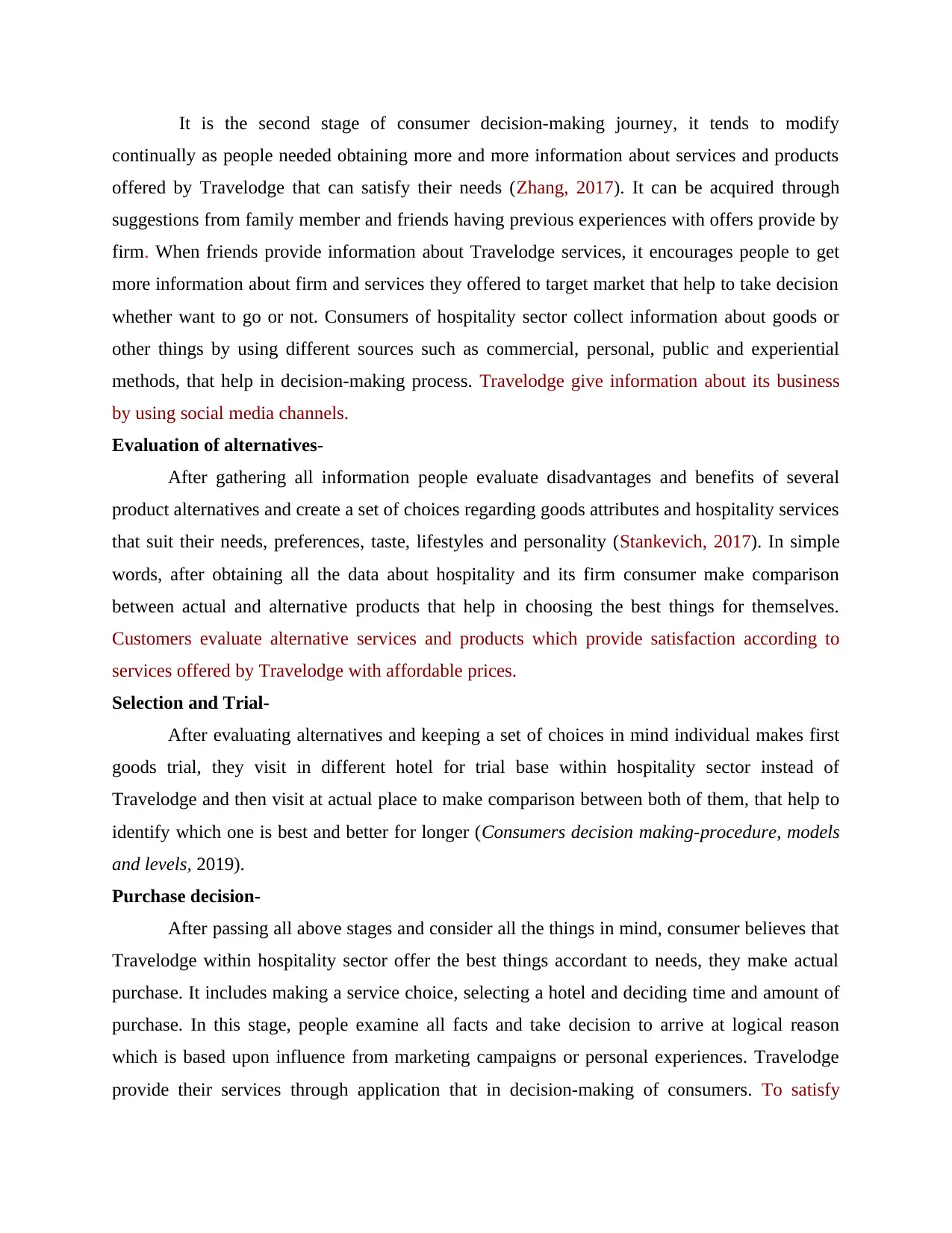
It is the second stage of consumer decision-making journey, it tends to modify
continually as people needed obtaining more and more information about services and products
offered by Travelodge that can satisfy their needs (Zhang, 2017). It can be acquired through
suggestions from family member and friends having previous experiences with offers provide by
firm. When friends provide information about Travelodge services, it encourages people to get
more information about firm and services they offered to target market that help to take decision
whether want to go or not. Consumers of hospitality sector collect information about goods or
other things by using different sources such as commercial, personal, public and experiential
methods, that help in decision-making process. Travelodge give information about its business
by using social media channels.
Evaluation of alternatives-
After gathering all information people evaluate disadvantages and benefits of several
product alternatives and create a set of choices regarding goods attributes and hospitality services
that suit their needs, preferences, taste, lifestyles and personality (Stankevich, 2017). In simple
words, after obtaining all the data about hospitality and its firm consumer make comparison
between actual and alternative products that help in choosing the best things for themselves.
Customers evaluate alternative services and products which provide satisfaction according to
services offered by Travelodge with affordable prices.
Selection and Trial-
After evaluating alternatives and keeping a set of choices in mind individual makes first
goods trial, they visit in different hotel for trial base within hospitality sector instead of
Travelodge and then visit at actual place to make comparison between both of them, that help to
identify which one is best and better for longer (Consumers decision making-procedure, models
and levels, 2019).
Purchase decision-
After passing all above stages and consider all the things in mind, consumer believes that
Travelodge within hospitality sector offer the best things accordant to needs, they make actual
purchase. It includes making a service choice, selecting a hotel and deciding time and amount of
purchase. In this stage, people examine all facts and take decision to arrive at logical reason
which is based upon influence from marketing campaigns or personal experiences. Travelodge
provide their services through application that in decision-making of consumers. To satisfy
continually as people needed obtaining more and more information about services and products
offered by Travelodge that can satisfy their needs (Zhang, 2017). It can be acquired through
suggestions from family member and friends having previous experiences with offers provide by
firm. When friends provide information about Travelodge services, it encourages people to get
more information about firm and services they offered to target market that help to take decision
whether want to go or not. Consumers of hospitality sector collect information about goods or
other things by using different sources such as commercial, personal, public and experiential
methods, that help in decision-making process. Travelodge give information about its business
by using social media channels.
Evaluation of alternatives-
After gathering all information people evaluate disadvantages and benefits of several
product alternatives and create a set of choices regarding goods attributes and hospitality services
that suit their needs, preferences, taste, lifestyles and personality (Stankevich, 2017). In simple
words, after obtaining all the data about hospitality and its firm consumer make comparison
between actual and alternative products that help in choosing the best things for themselves.
Customers evaluate alternative services and products which provide satisfaction according to
services offered by Travelodge with affordable prices.
Selection and Trial-
After evaluating alternatives and keeping a set of choices in mind individual makes first
goods trial, they visit in different hotel for trial base within hospitality sector instead of
Travelodge and then visit at actual place to make comparison between both of them, that help to
identify which one is best and better for longer (Consumers decision making-procedure, models
and levels, 2019).
Purchase decision-
After passing all above stages and consider all the things in mind, consumer believes that
Travelodge within hospitality sector offer the best things accordant to needs, they make actual
purchase. It includes making a service choice, selecting a hotel and deciding time and amount of
purchase. In this stage, people examine all facts and take decision to arrive at logical reason
which is based upon influence from marketing campaigns or personal experiences. Travelodge
provide their services through application that in decision-making of consumers. To satisfy
Paraphrase This Document
Need a fresh take? Get an instant paraphrase of this document with our AI Paraphraser
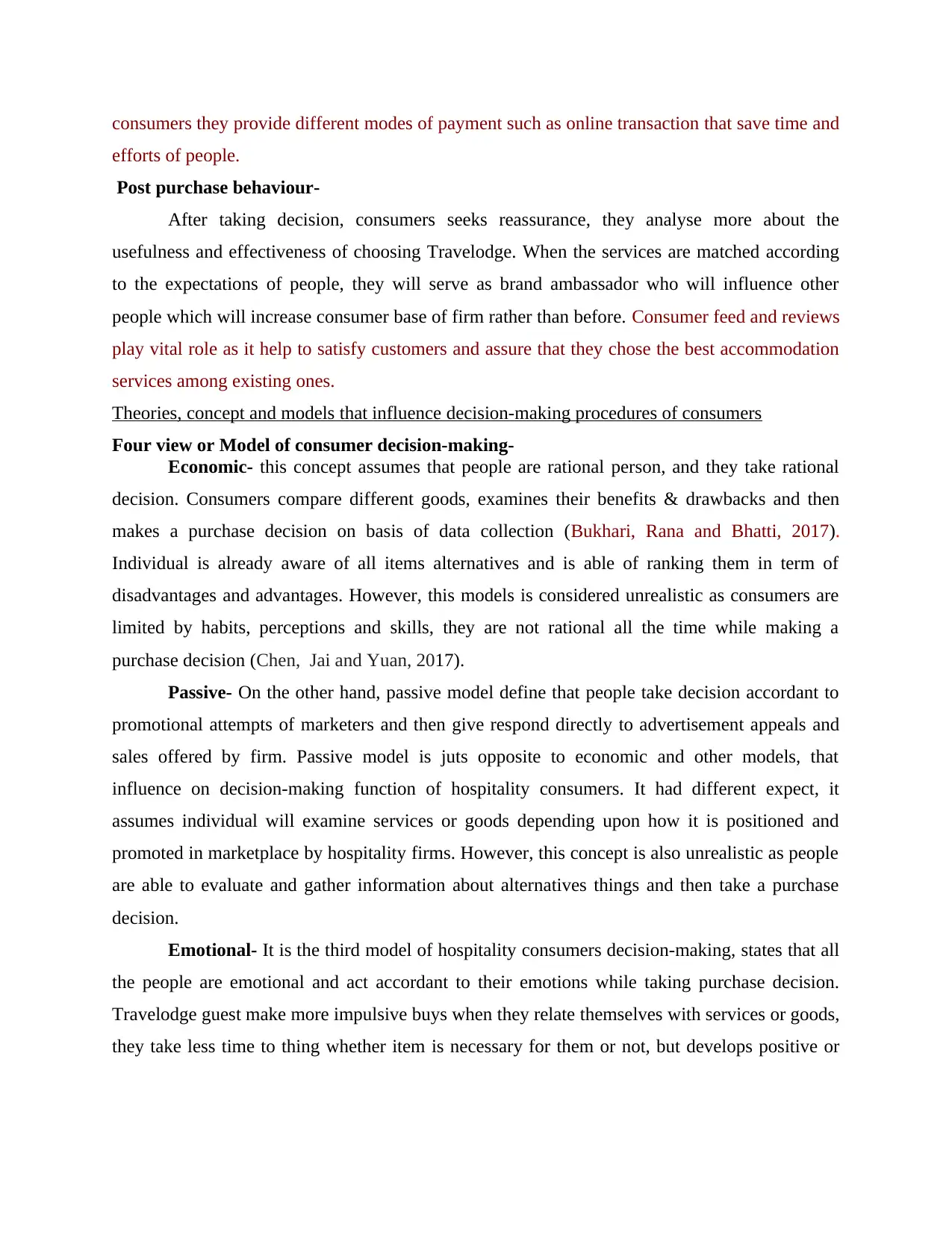
consumers they provide different modes of payment such as online transaction that save time and
efforts of people.
Post purchase behaviour-
After taking decision, consumers seeks reassurance, they analyse more about the
usefulness and effectiveness of choosing Travelodge. When the services are matched according
to the expectations of people, they will serve as brand ambassador who will influence other
people which will increase consumer base of firm rather than before. Consumer feed and reviews
play vital role as it help to satisfy customers and assure that they chose the best accommodation
services among existing ones.
Theories, concept and models that influence decision-making procedures of consumers
Four view or Model of consumer decision-making-
Economic- this concept assumes that people are rational person, and they take rational
decision. Consumers compare different goods, examines their benefits & drawbacks and then
makes a purchase decision on basis of data collection (Bukhari, Rana and Bhatti, 2017).
Individual is already aware of all items alternatives and is able of ranking them in term of
disadvantages and advantages. However, this models is considered unrealistic as consumers are
limited by habits, perceptions and skills, they are not rational all the time while making a
purchase decision (Chen, Jai and Yuan, 2017).
Passive- On the other hand, passive model define that people take decision accordant to
promotional attempts of marketers and then give respond directly to advertisement appeals and
sales offered by firm. Passive model is juts opposite to economic and other models, that
influence on decision-making function of hospitality consumers. It had different expect, it
assumes individual will examine services or goods depending upon how it is positioned and
promoted in marketplace by hospitality firms. However, this concept is also unrealistic as people
are able to evaluate and gather information about alternatives things and then take a purchase
decision.
Emotional- It is the third model of hospitality consumers decision-making, states that all
the people are emotional and act accordant to their emotions while taking purchase decision.
Travelodge guest make more impulsive buys when they relate themselves with services or goods,
they take less time to thing whether item is necessary for them or not, but develops positive or
efforts of people.
Post purchase behaviour-
After taking decision, consumers seeks reassurance, they analyse more about the
usefulness and effectiveness of choosing Travelodge. When the services are matched according
to the expectations of people, they will serve as brand ambassador who will influence other
people which will increase consumer base of firm rather than before. Consumer feed and reviews
play vital role as it help to satisfy customers and assure that they chose the best accommodation
services among existing ones.
Theories, concept and models that influence decision-making procedures of consumers
Four view or Model of consumer decision-making-
Economic- this concept assumes that people are rational person, and they take rational
decision. Consumers compare different goods, examines their benefits & drawbacks and then
makes a purchase decision on basis of data collection (Bukhari, Rana and Bhatti, 2017).
Individual is already aware of all items alternatives and is able of ranking them in term of
disadvantages and advantages. However, this models is considered unrealistic as consumers are
limited by habits, perceptions and skills, they are not rational all the time while making a
purchase decision (Chen, Jai and Yuan, 2017).
Passive- On the other hand, passive model define that people take decision accordant to
promotional attempts of marketers and then give respond directly to advertisement appeals and
sales offered by firm. Passive model is juts opposite to economic and other models, that
influence on decision-making function of hospitality consumers. It had different expect, it
assumes individual will examine services or goods depending upon how it is positioned and
promoted in marketplace by hospitality firms. However, this concept is also unrealistic as people
are able to evaluate and gather information about alternatives things and then take a purchase
decision.
Emotional- It is the third model of hospitality consumers decision-making, states that all
the people are emotional and act accordant to their emotions while taking purchase decision.
Travelodge guest make more impulsive buys when they relate themselves with services or goods,
they take less time to thing whether item is necessary for them or not, but develops positive or
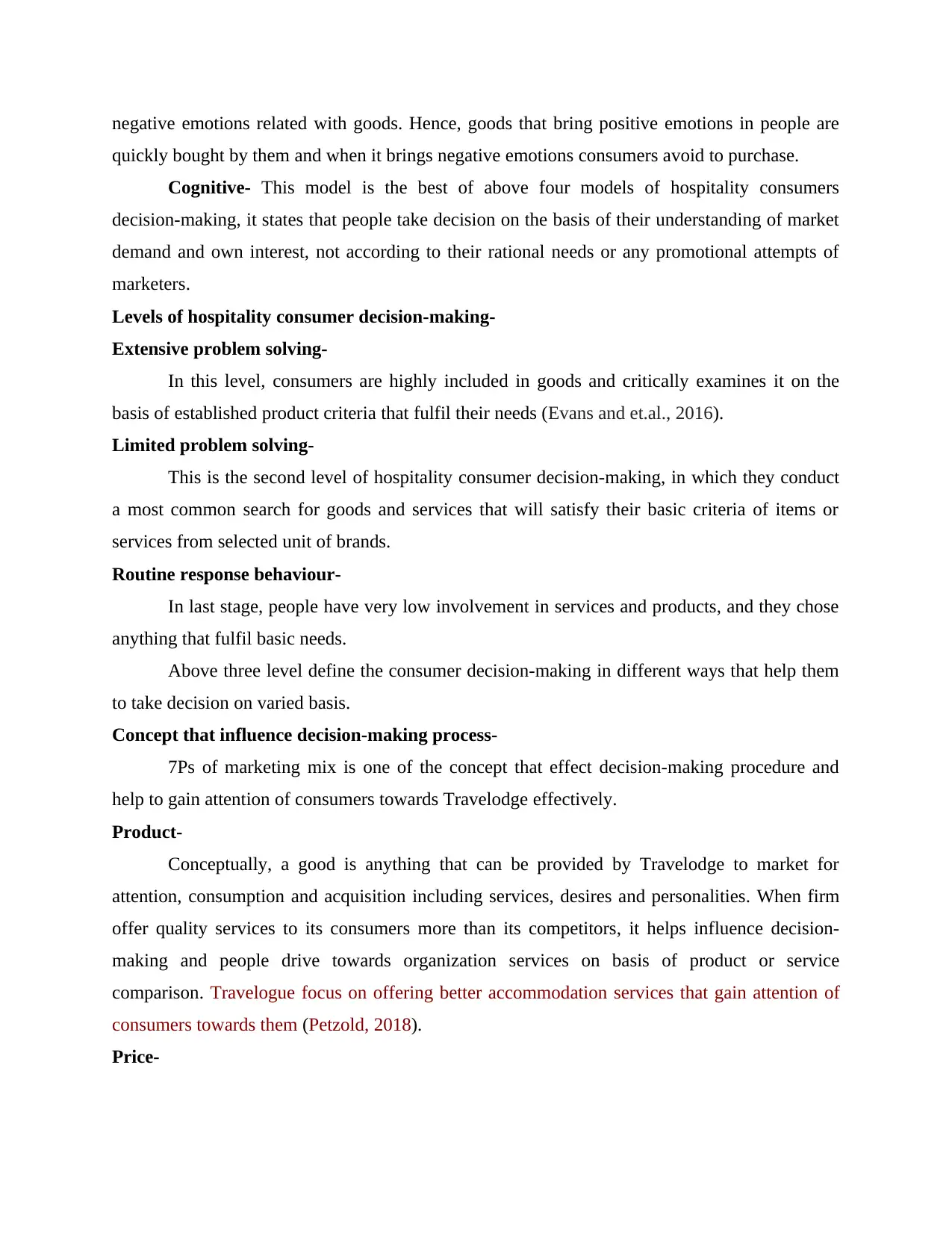
negative emotions related with goods. Hence, goods that bring positive emotions in people are
quickly bought by them and when it brings negative emotions consumers avoid to purchase.
Cognitive- This model is the best of above four models of hospitality consumers
decision-making, it states that people take decision on the basis of their understanding of market
demand and own interest, not according to their rational needs or any promotional attempts of
marketers.
Levels of hospitality consumer decision-making-
Extensive problem solving-
In this level, consumers are highly included in goods and critically examines it on the
basis of established product criteria that fulfil their needs (Evans and et.al., 2016).
Limited problem solving-
This is the second level of hospitality consumer decision-making, in which they conduct
a most common search for goods and services that will satisfy their basic criteria of items or
services from selected unit of brands.
Routine response behaviour-
In last stage, people have very low involvement in services and products, and they chose
anything that fulfil basic needs.
Above three level define the consumer decision-making in different ways that help them
to take decision on varied basis.
Concept that influence decision-making process-
7Ps of marketing mix is one of the concept that effect decision-making procedure and
help to gain attention of consumers towards Travelodge effectively.
Product-
Conceptually, a good is anything that can be provided by Travelodge to market for
attention, consumption and acquisition including services, desires and personalities. When firm
offer quality services to its consumers more than its competitors, it helps influence decision-
making and people drive towards organization services on basis of product or service
comparison. Travelogue focus on offering better accommodation services that gain attention of
consumers towards them (Petzold, 2018).
Price-
quickly bought by them and when it brings negative emotions consumers avoid to purchase.
Cognitive- This model is the best of above four models of hospitality consumers
decision-making, it states that people take decision on the basis of their understanding of market
demand and own interest, not according to their rational needs or any promotional attempts of
marketers.
Levels of hospitality consumer decision-making-
Extensive problem solving-
In this level, consumers are highly included in goods and critically examines it on the
basis of established product criteria that fulfil their needs (Evans and et.al., 2016).
Limited problem solving-
This is the second level of hospitality consumer decision-making, in which they conduct
a most common search for goods and services that will satisfy their basic criteria of items or
services from selected unit of brands.
Routine response behaviour-
In last stage, people have very low involvement in services and products, and they chose
anything that fulfil basic needs.
Above three level define the consumer decision-making in different ways that help them
to take decision on varied basis.
Concept that influence decision-making process-
7Ps of marketing mix is one of the concept that effect decision-making procedure and
help to gain attention of consumers towards Travelodge effectively.
Product-
Conceptually, a good is anything that can be provided by Travelodge to market for
attention, consumption and acquisition including services, desires and personalities. When firm
offer quality services to its consumers more than its competitors, it helps influence decision-
making and people drive towards organization services on basis of product or service
comparison. Travelogue focus on offering better accommodation services that gain attention of
consumers towards them (Petzold, 2018).
Price-
⊘ This is a preview!⊘
Do you want full access?
Subscribe today to unlock all pages.

Trusted by 1+ million students worldwide
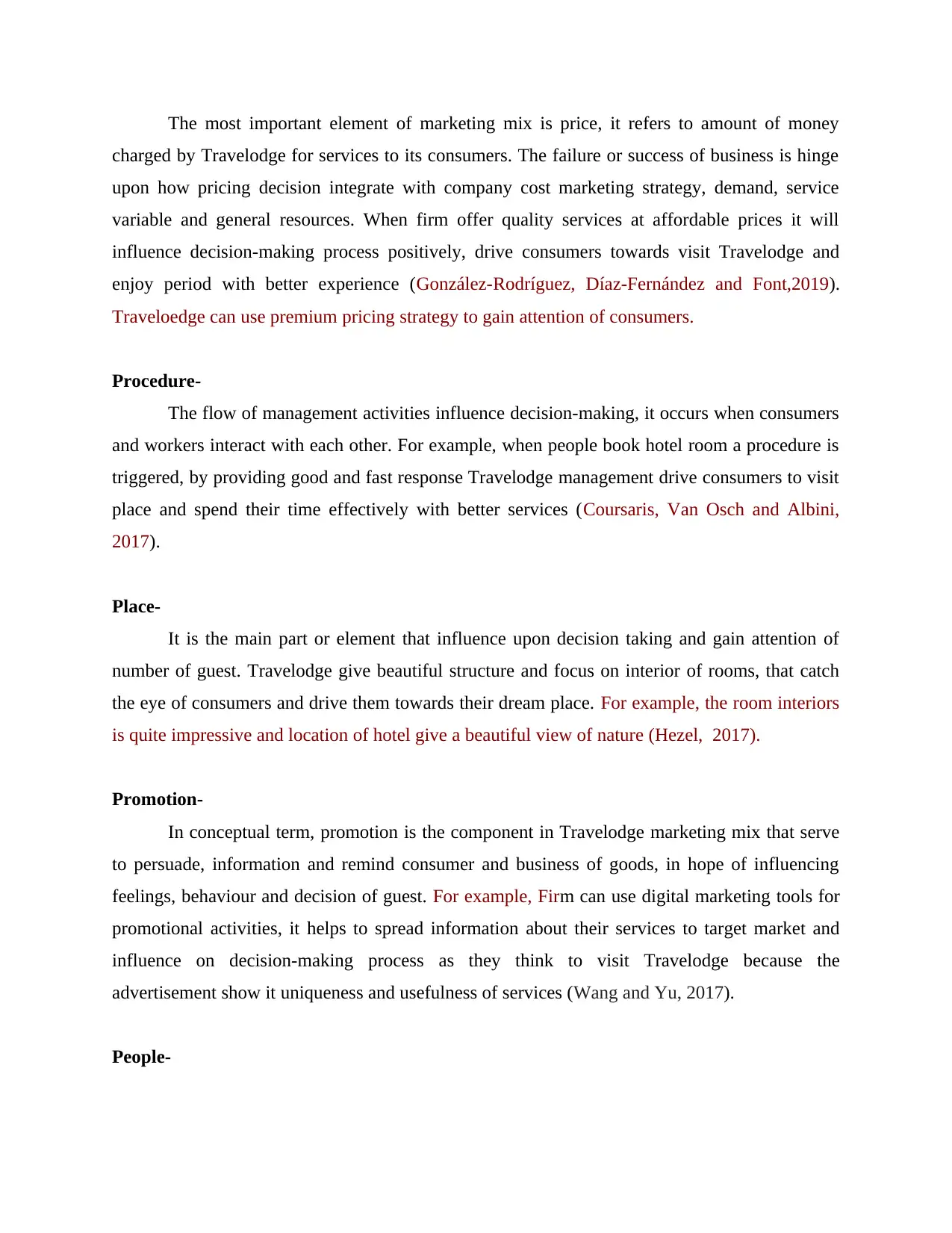
The most important element of marketing mix is price, it refers to amount of money
charged by Travelodge for services to its consumers. The failure or success of business is hinge
upon how pricing decision integrate with company cost marketing strategy, demand, service
variable and general resources. When firm offer quality services at affordable prices it will
influence decision-making process positively, drive consumers towards visit Travelodge and
enjoy period with better experience (González-Rodríguez, Díaz-Fernández and Font,2019).
Traveloedge can use premium pricing strategy to gain attention of consumers.
Procedure-
The flow of management activities influence decision-making, it occurs when consumers
and workers interact with each other. For example, when people book hotel room a procedure is
triggered, by providing good and fast response Travelodge management drive consumers to visit
place and spend their time effectively with better services (Coursaris, Van Osch and Albini,
2017).
Place-
It is the main part or element that influence upon decision taking and gain attention of
number of guest. Travelodge give beautiful structure and focus on interior of rooms, that catch
the eye of consumers and drive them towards their dream place. For example, the room interiors
is quite impressive and location of hotel give a beautiful view of nature (Hezel, 2017).
Promotion-
In conceptual term, promotion is the component in Travelodge marketing mix that serve
to persuade, information and remind consumer and business of goods, in hope of influencing
feelings, behaviour and decision of guest. For example, Firm can use digital marketing tools for
promotional activities, it helps to spread information about their services to target market and
influence on decision-making process as they think to visit Travelodge because the
advertisement show it uniqueness and usefulness of services (Wang and Yu, 2017).
People-
charged by Travelodge for services to its consumers. The failure or success of business is hinge
upon how pricing decision integrate with company cost marketing strategy, demand, service
variable and general resources. When firm offer quality services at affordable prices it will
influence decision-making process positively, drive consumers towards visit Travelodge and
enjoy period with better experience (González-Rodríguez, Díaz-Fernández and Font,2019).
Traveloedge can use premium pricing strategy to gain attention of consumers.
Procedure-
The flow of management activities influence decision-making, it occurs when consumers
and workers interact with each other. For example, when people book hotel room a procedure is
triggered, by providing good and fast response Travelodge management drive consumers to visit
place and spend their time effectively with better services (Coursaris, Van Osch and Albini,
2017).
Place-
It is the main part or element that influence upon decision taking and gain attention of
number of guest. Travelodge give beautiful structure and focus on interior of rooms, that catch
the eye of consumers and drive them towards their dream place. For example, the room interiors
is quite impressive and location of hotel give a beautiful view of nature (Hezel, 2017).
Promotion-
In conceptual term, promotion is the component in Travelodge marketing mix that serve
to persuade, information and remind consumer and business of goods, in hope of influencing
feelings, behaviour and decision of guest. For example, Firm can use digital marketing tools for
promotional activities, it helps to spread information about their services to target market and
influence on decision-making process as they think to visit Travelodge because the
advertisement show it uniqueness and usefulness of services (Wang and Yu, 2017).
People-
Paraphrase This Document
Need a fresh take? Get an instant paraphrase of this document with our AI Paraphraser
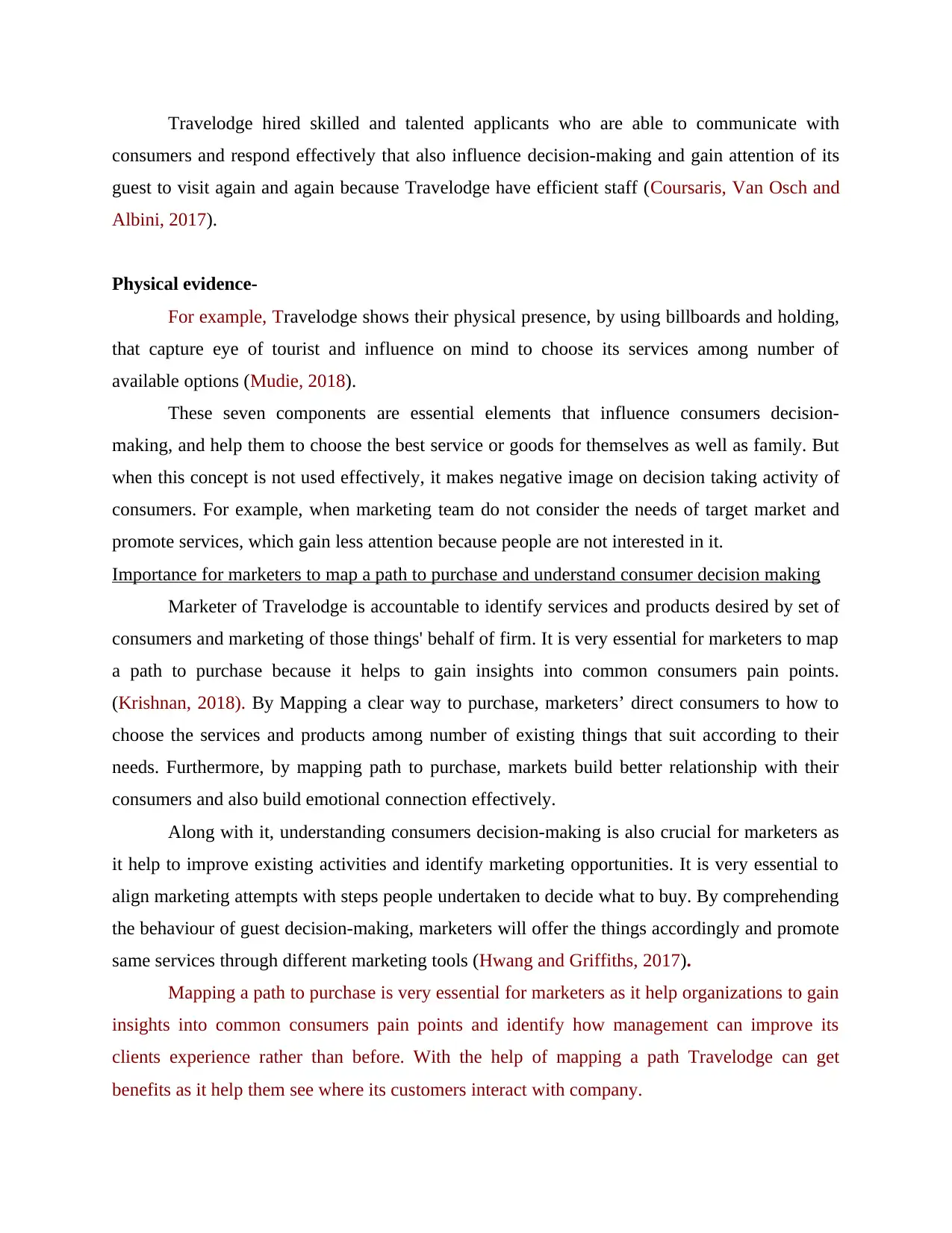
Travelodge hired skilled and talented applicants who are able to communicate with
consumers and respond effectively that also influence decision-making and gain attention of its
guest to visit again and again because Travelodge have efficient staff (Coursaris, Van Osch and
Albini, 2017).
Physical evidence-
For example, Travelodge shows their physical presence, by using billboards and holding,
that capture eye of tourist and influence on mind to choose its services among number of
available options (Mudie, 2018).
These seven components are essential elements that influence consumers decision-
making, and help them to choose the best service or goods for themselves as well as family. But
when this concept is not used effectively, it makes negative image on decision taking activity of
consumers. For example, when marketing team do not consider the needs of target market and
promote services, which gain less attention because people are not interested in it.
Importance for marketers to map a path to purchase and understand consumer decision making
Marketer of Travelodge is accountable to identify services and products desired by set of
consumers and marketing of those things' behalf of firm. It is very essential for marketers to map
a path to purchase because it helps to gain insights into common consumers pain points.
(Krishnan, 2018). By Mapping a clear way to purchase, marketers’ direct consumers to how to
choose the services and products among number of existing things that suit according to their
needs. Furthermore, by mapping path to purchase, markets build better relationship with their
consumers and also build emotional connection effectively.
Along with it, understanding consumers decision-making is also crucial for marketers as
it help to improve existing activities and identify marketing opportunities. It is very essential to
align marketing attempts with steps people undertaken to decide what to buy. By comprehending
the behaviour of guest decision-making, marketers will offer the things accordingly and promote
same services through different marketing tools (Hwang and Griffiths, 2017).
Mapping a path to purchase is very essential for marketers as it help organizations to gain
insights into common consumers pain points and identify how management can improve its
clients experience rather than before. With the help of mapping a path Travelodge can get
benefits as it help them see where its customers interact with company.
consumers and respond effectively that also influence decision-making and gain attention of its
guest to visit again and again because Travelodge have efficient staff (Coursaris, Van Osch and
Albini, 2017).
Physical evidence-
For example, Travelodge shows their physical presence, by using billboards and holding,
that capture eye of tourist and influence on mind to choose its services among number of
available options (Mudie, 2018).
These seven components are essential elements that influence consumers decision-
making, and help them to choose the best service or goods for themselves as well as family. But
when this concept is not used effectively, it makes negative image on decision taking activity of
consumers. For example, when marketing team do not consider the needs of target market and
promote services, which gain less attention because people are not interested in it.
Importance for marketers to map a path to purchase and understand consumer decision making
Marketer of Travelodge is accountable to identify services and products desired by set of
consumers and marketing of those things' behalf of firm. It is very essential for marketers to map
a path to purchase because it helps to gain insights into common consumers pain points.
(Krishnan, 2018). By Mapping a clear way to purchase, marketers’ direct consumers to how to
choose the services and products among number of existing things that suit according to their
needs. Furthermore, by mapping path to purchase, markets build better relationship with their
consumers and also build emotional connection effectively.
Along with it, understanding consumers decision-making is also crucial for marketers as
it help to improve existing activities and identify marketing opportunities. It is very essential to
align marketing attempts with steps people undertaken to decide what to buy. By comprehending
the behaviour of guest decision-making, marketers will offer the things accordingly and promote
same services through different marketing tools (Hwang and Griffiths, 2017).
Mapping a path to purchase is very essential for marketers as it help organizations to gain
insights into common consumers pain points and identify how management can improve its
clients experience rather than before. With the help of mapping a path Travelodge can get
benefits as it help them see where its customers interact with company.
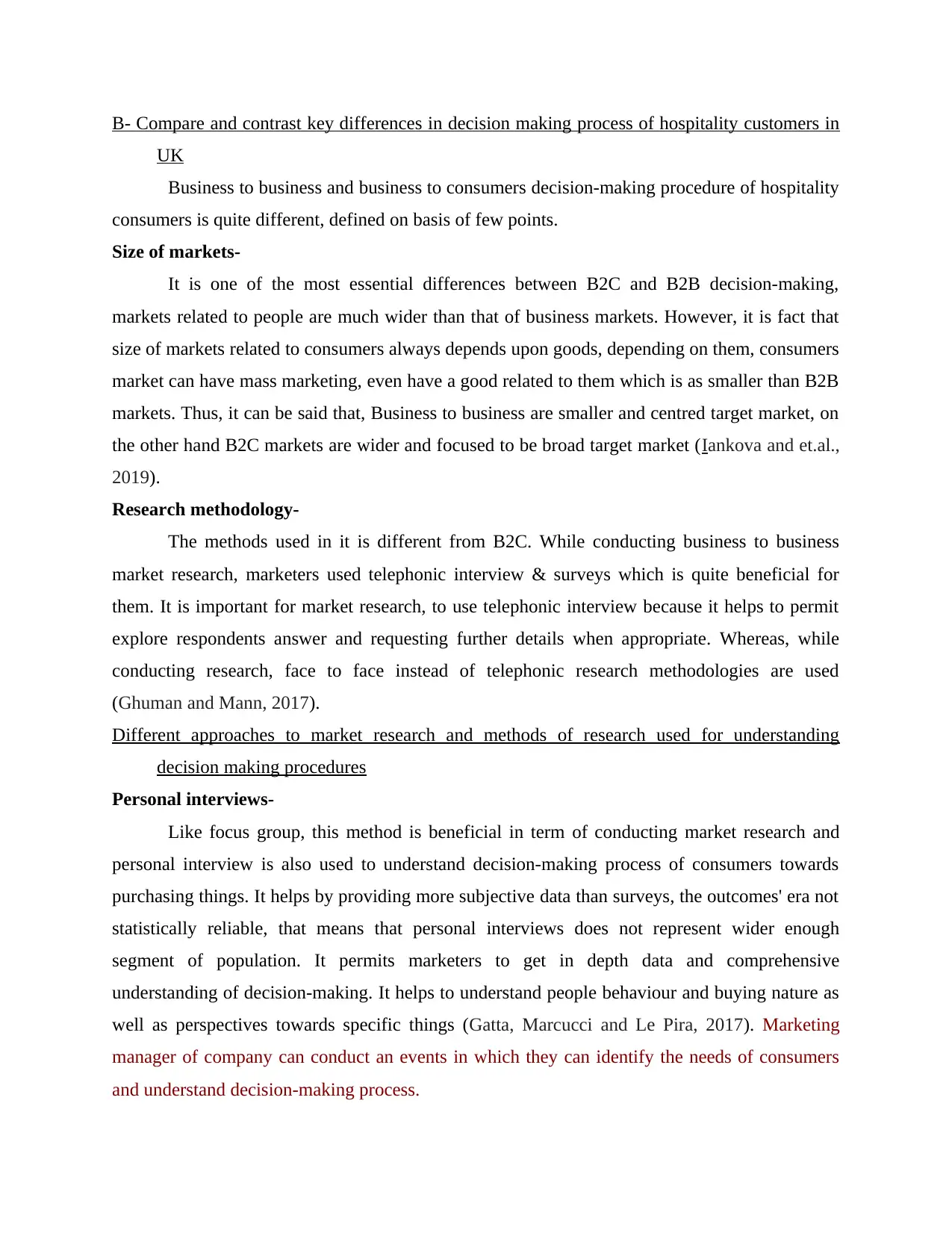
B- Compare and contrast key differences in decision making process of hospitality customers in
UK
Business to business and business to consumers decision-making procedure of hospitality
consumers is quite different, defined on basis of few points.
Size of markets-
It is one of the most essential differences between B2C and B2B decision-making,
markets related to people are much wider than that of business markets. However, it is fact that
size of markets related to consumers always depends upon goods, depending on them, consumers
market can have mass marketing, even have a good related to them which is as smaller than B2B
markets. Thus, it can be said that, Business to business are smaller and centred target market, on
the other hand B2C markets are wider and focused to be broad target market (Iankova and et.al.,
2019).
Research methodology-
The methods used in it is different from B2C. While conducting business to business
market research, marketers used telephonic interview & surveys which is quite beneficial for
them. It is important for market research, to use telephonic interview because it helps to permit
explore respondents answer and requesting further details when appropriate. Whereas, while
conducting research, face to face instead of telephonic research methodologies are used
(Ghuman and Mann, 2017).
Different approaches to market research and methods of research used for understanding
decision making procedures
Personal interviews-
Like focus group, this method is beneficial in term of conducting market research and
personal interview is also used to understand decision-making process of consumers towards
purchasing things. It helps by providing more subjective data than surveys, the outcomes' era not
statistically reliable, that means that personal interviews does not represent wider enough
segment of population. It permits marketers to get in depth data and comprehensive
understanding of decision-making. It helps to understand people behaviour and buying nature as
well as perspectives towards specific things (Gatta, Marcucci and Le Pira, 2017). Marketing
manager of company can conduct an events in which they can identify the needs of consumers
and understand decision-making process.
UK
Business to business and business to consumers decision-making procedure of hospitality
consumers is quite different, defined on basis of few points.
Size of markets-
It is one of the most essential differences between B2C and B2B decision-making,
markets related to people are much wider than that of business markets. However, it is fact that
size of markets related to consumers always depends upon goods, depending on them, consumers
market can have mass marketing, even have a good related to them which is as smaller than B2B
markets. Thus, it can be said that, Business to business are smaller and centred target market, on
the other hand B2C markets are wider and focused to be broad target market (Iankova and et.al.,
2019).
Research methodology-
The methods used in it is different from B2C. While conducting business to business
market research, marketers used telephonic interview & surveys which is quite beneficial for
them. It is important for market research, to use telephonic interview because it helps to permit
explore respondents answer and requesting further details when appropriate. Whereas, while
conducting research, face to face instead of telephonic research methodologies are used
(Ghuman and Mann, 2017).
Different approaches to market research and methods of research used for understanding
decision making procedures
Personal interviews-
Like focus group, this method is beneficial in term of conducting market research and
personal interview is also used to understand decision-making process of consumers towards
purchasing things. It helps by providing more subjective data than surveys, the outcomes' era not
statistically reliable, that means that personal interviews does not represent wider enough
segment of population. It permits marketers to get in depth data and comprehensive
understanding of decision-making. It helps to understand people behaviour and buying nature as
well as perspectives towards specific things (Gatta, Marcucci and Le Pira, 2017). Marketing
manager of company can conduct an events in which they can identify the needs of consumers
and understand decision-making process.
⊘ This is a preview!⊘
Do you want full access?
Subscribe today to unlock all pages.

Trusted by 1+ million students worldwide
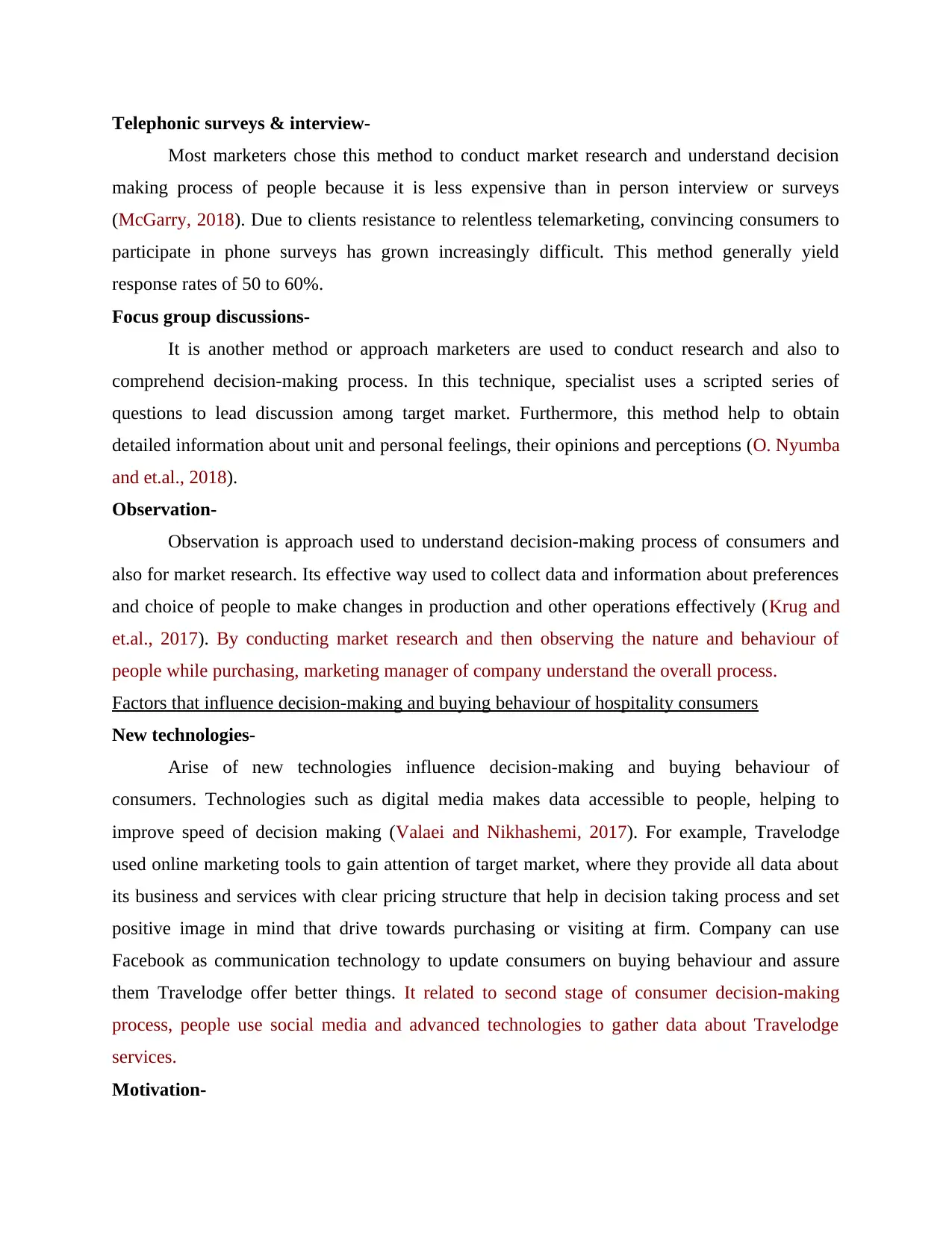
Telephonic surveys & interview-
Most marketers chose this method to conduct market research and understand decision
making process of people because it is less expensive than in person interview or surveys
(McGarry, 2018). Due to clients resistance to relentless telemarketing, convincing consumers to
participate in phone surveys has grown increasingly difficult. This method generally yield
response rates of 50 to 60%.
Focus group discussions-
It is another method or approach marketers are used to conduct research and also to
comprehend decision-making process. In this technique, specialist uses a scripted series of
questions to lead discussion among target market. Furthermore, this method help to obtain
detailed information about unit and personal feelings, their opinions and perceptions (O. Nyumba
and et.al., 2018).
Observation-
Observation is approach used to understand decision-making process of consumers and
also for market research. Its effective way used to collect data and information about preferences
and choice of people to make changes in production and other operations effectively (Krug and
et.al., 2017). By conducting market research and then observing the nature and behaviour of
people while purchasing, marketing manager of company understand the overall process.
Factors that influence decision-making and buying behaviour of hospitality consumers
New technologies-
Arise of new technologies influence decision-making and buying behaviour of
consumers. Technologies such as digital media makes data accessible to people, helping to
improve speed of decision making (Valaei and Nikhashemi, 2017). For example, Travelodge
used online marketing tools to gain attention of target market, where they provide all data about
its business and services with clear pricing structure that help in decision taking process and set
positive image in mind that drive towards purchasing or visiting at firm. Company can use
Facebook as communication technology to update consumers on buying behaviour and assure
them Travelodge offer better things. It related to second stage of consumer decision-making
process, people use social media and advanced technologies to gather data about Travelodge
services.
Motivation-
Most marketers chose this method to conduct market research and understand decision
making process of people because it is less expensive than in person interview or surveys
(McGarry, 2018). Due to clients resistance to relentless telemarketing, convincing consumers to
participate in phone surveys has grown increasingly difficult. This method generally yield
response rates of 50 to 60%.
Focus group discussions-
It is another method or approach marketers are used to conduct research and also to
comprehend decision-making process. In this technique, specialist uses a scripted series of
questions to lead discussion among target market. Furthermore, this method help to obtain
detailed information about unit and personal feelings, their opinions and perceptions (O. Nyumba
and et.al., 2018).
Observation-
Observation is approach used to understand decision-making process of consumers and
also for market research. Its effective way used to collect data and information about preferences
and choice of people to make changes in production and other operations effectively (Krug and
et.al., 2017). By conducting market research and then observing the nature and behaviour of
people while purchasing, marketing manager of company understand the overall process.
Factors that influence decision-making and buying behaviour of hospitality consumers
New technologies-
Arise of new technologies influence decision-making and buying behaviour of
consumers. Technologies such as digital media makes data accessible to people, helping to
improve speed of decision making (Valaei and Nikhashemi, 2017). For example, Travelodge
used online marketing tools to gain attention of target market, where they provide all data about
its business and services with clear pricing structure that help in decision taking process and set
positive image in mind that drive towards purchasing or visiting at firm. Company can use
Facebook as communication technology to update consumers on buying behaviour and assure
them Travelodge offer better things. It related to second stage of consumer decision-making
process, people use social media and advanced technologies to gather data about Travelodge
services.
Motivation-
Paraphrase This Document
Need a fresh take? Get an instant paraphrase of this document with our AI Paraphraser
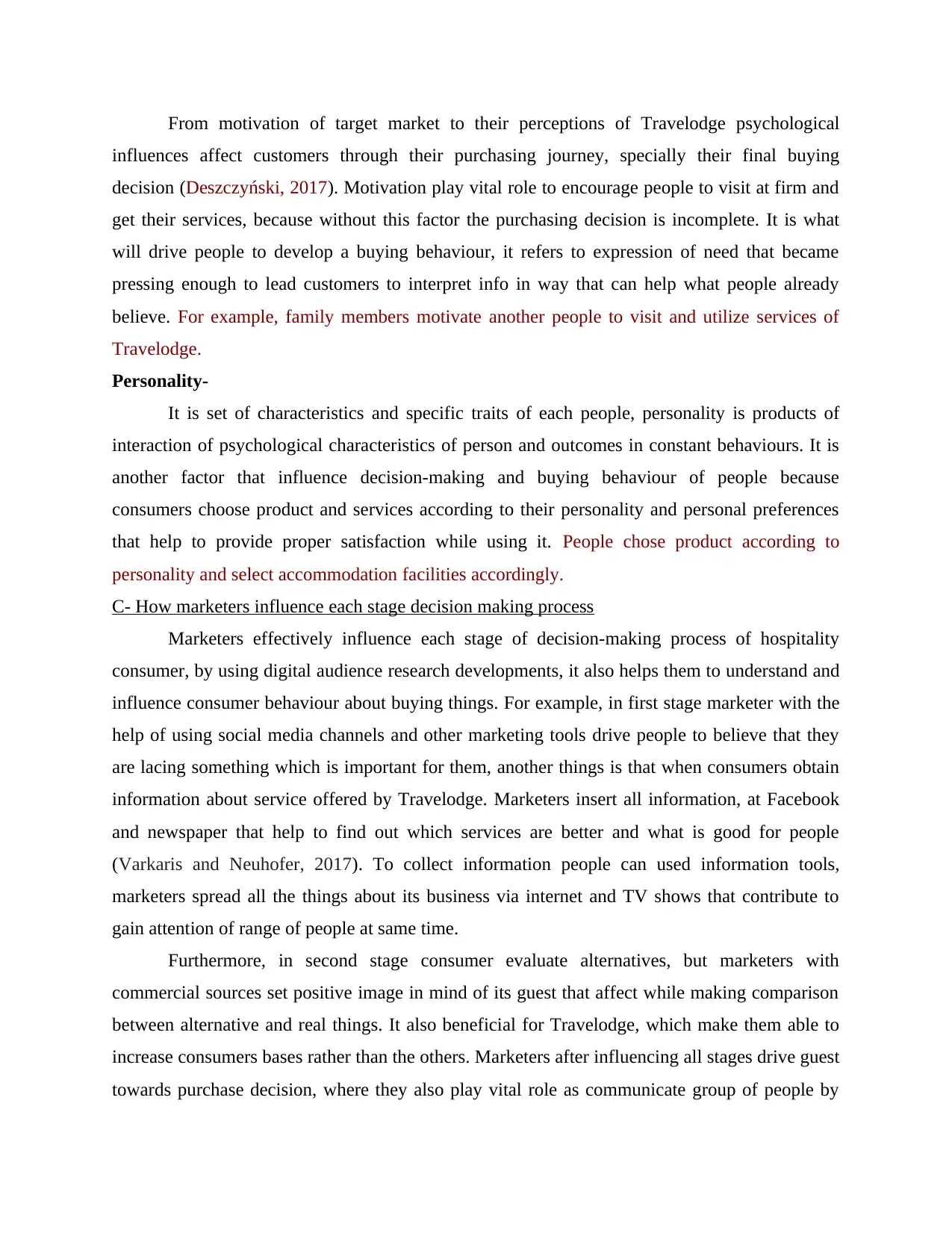
From motivation of target market to their perceptions of Travelodge psychological
influences affect customers through their purchasing journey, specially their final buying
decision (Deszczyński, 2017). Motivation play vital role to encourage people to visit at firm and
get their services, because without this factor the purchasing decision is incomplete. It is what
will drive people to develop a buying behaviour, it refers to expression of need that became
pressing enough to lead customers to interpret info in way that can help what people already
believe. For example, family members motivate another people to visit and utilize services of
Travelodge.
Personality-
It is set of characteristics and specific traits of each people, personality is products of
interaction of psychological characteristics of person and outcomes in constant behaviours. It is
another factor that influence decision-making and buying behaviour of people because
consumers choose product and services according to their personality and personal preferences
that help to provide proper satisfaction while using it. People chose product according to
personality and select accommodation facilities accordingly.
C- How marketers influence each stage decision making process
Marketers effectively influence each stage of decision-making process of hospitality
consumer, by using digital audience research developments, it also helps them to understand and
influence consumer behaviour about buying things. For example, in first stage marketer with the
help of using social media channels and other marketing tools drive people to believe that they
are lacing something which is important for them, another things is that when consumers obtain
information about service offered by Travelodge. Marketers insert all information, at Facebook
and newspaper that help to find out which services are better and what is good for people
(Varkaris and Neuhofer, 2017). To collect information people can used information tools,
marketers spread all the things about its business via internet and TV shows that contribute to
gain attention of range of people at same time.
Furthermore, in second stage consumer evaluate alternatives, but marketers with
commercial sources set positive image in mind of its guest that affect while making comparison
between alternative and real things. It also beneficial for Travelodge, which make them able to
increase consumers bases rather than the others. Marketers after influencing all stages drive guest
towards purchase decision, where they also play vital role as communicate group of people by
influences affect customers through their purchasing journey, specially their final buying
decision (Deszczyński, 2017). Motivation play vital role to encourage people to visit at firm and
get their services, because without this factor the purchasing decision is incomplete. It is what
will drive people to develop a buying behaviour, it refers to expression of need that became
pressing enough to lead customers to interpret info in way that can help what people already
believe. For example, family members motivate another people to visit and utilize services of
Travelodge.
Personality-
It is set of characteristics and specific traits of each people, personality is products of
interaction of psychological characteristics of person and outcomes in constant behaviours. It is
another factor that influence decision-making and buying behaviour of people because
consumers choose product and services according to their personality and personal preferences
that help to provide proper satisfaction while using it. People chose product according to
personality and select accommodation facilities accordingly.
C- How marketers influence each stage decision making process
Marketers effectively influence each stage of decision-making process of hospitality
consumer, by using digital audience research developments, it also helps them to understand and
influence consumer behaviour about buying things. For example, in first stage marketer with the
help of using social media channels and other marketing tools drive people to believe that they
are lacing something which is important for them, another things is that when consumers obtain
information about service offered by Travelodge. Marketers insert all information, at Facebook
and newspaper that help to find out which services are better and what is good for people
(Varkaris and Neuhofer, 2017). To collect information people can used information tools,
marketers spread all the things about its business via internet and TV shows that contribute to
gain attention of range of people at same time.
Furthermore, in second stage consumer evaluate alternatives, but marketers with
commercial sources set positive image in mind of its guest that affect while making comparison
between alternative and real things. It also beneficial for Travelodge, which make them able to
increase consumers bases rather than the others. Marketers after influencing all stages drive guest
towards purchase decision, where they also play vital role as communicate group of people by
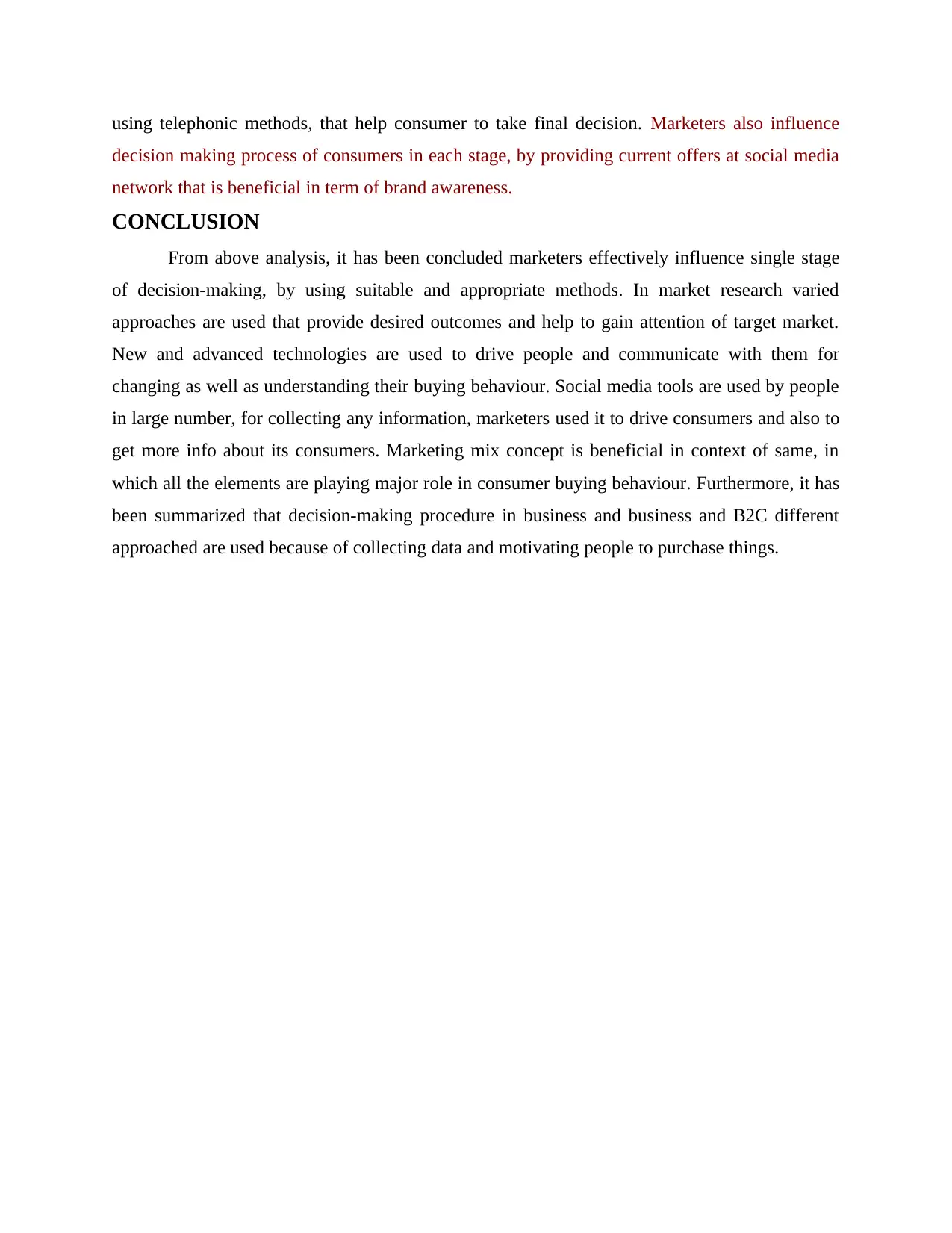
using telephonic methods, that help consumer to take final decision. Marketers also influence
decision making process of consumers in each stage, by providing current offers at social media
network that is beneficial in term of brand awareness.
CONCLUSION
From above analysis, it has been concluded marketers effectively influence single stage
of decision-making, by using suitable and appropriate methods. In market research varied
approaches are used that provide desired outcomes and help to gain attention of target market.
New and advanced technologies are used to drive people and communicate with them for
changing as well as understanding their buying behaviour. Social media tools are used by people
in large number, for collecting any information, marketers used it to drive consumers and also to
get more info about its consumers. Marketing mix concept is beneficial in context of same, in
which all the elements are playing major role in consumer buying behaviour. Furthermore, it has
been summarized that decision-making procedure in business and business and B2C different
approached are used because of collecting data and motivating people to purchase things.
decision making process of consumers in each stage, by providing current offers at social media
network that is beneficial in term of brand awareness.
CONCLUSION
From above analysis, it has been concluded marketers effectively influence single stage
of decision-making, by using suitable and appropriate methods. In market research varied
approaches are used that provide desired outcomes and help to gain attention of target market.
New and advanced technologies are used to drive people and communicate with them for
changing as well as understanding their buying behaviour. Social media tools are used by people
in large number, for collecting any information, marketers used it to drive consumers and also to
get more info about its consumers. Marketing mix concept is beneficial in context of same, in
which all the elements are playing major role in consumer buying behaviour. Furthermore, it has
been summarized that decision-making procedure in business and business and B2C different
approached are used because of collecting data and motivating people to purchase things.
⊘ This is a preview!⊘
Do you want full access?
Subscribe today to unlock all pages.

Trusted by 1+ million students worldwide
1 out of 14
Related Documents
Your All-in-One AI-Powered Toolkit for Academic Success.
+13062052269
info@desklib.com
Available 24*7 on WhatsApp / Email
![[object Object]](/_next/static/media/star-bottom.7253800d.svg)
Unlock your academic potential
Copyright © 2020–2026 A2Z Services. All Rights Reserved. Developed and managed by ZUCOL.





